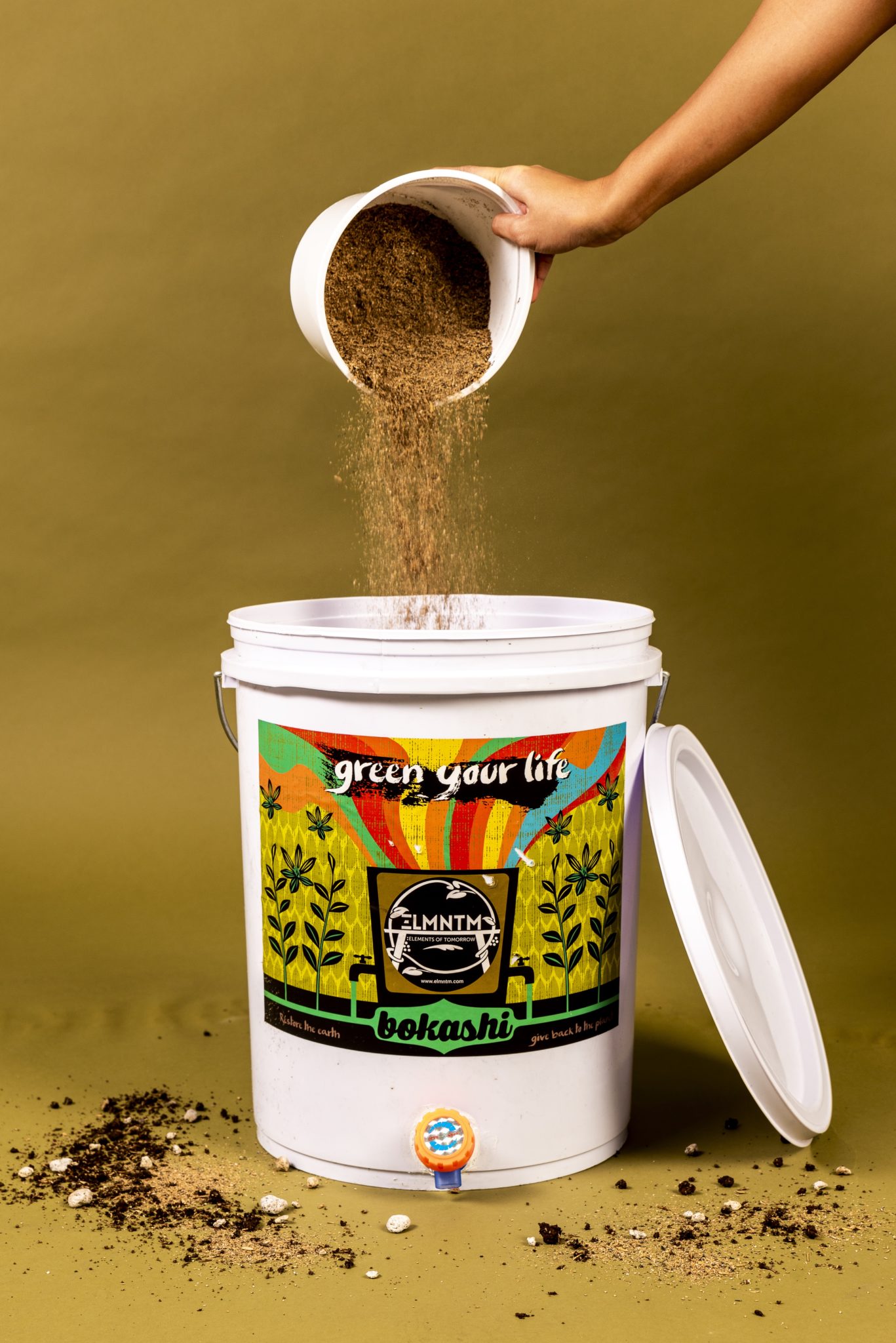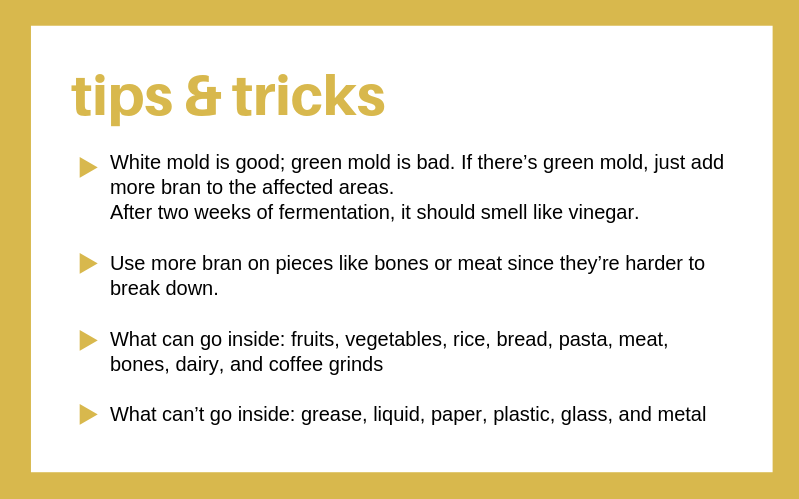It’s no secret that restaurants and food establishments also come with a lot of food waste. Sometimes it can’t be helped, especially if customers bill out with their plates half-full. When situations like this happen, the usual action is to throw the leftovers away. But how it’s disposed of could determine the environmental impact of restaurants.
“The impact of waste from restaurants goes beyond the kitchen,” says Gio Espital, founder of Elmntm: Elements of Tomorrow. “Because even after it’s picked up for disposal, it’s often brought to dumpsites where they rot further in open air and eventually contribute to greenhouse gases that damage the environment.”
One way to dispose of food waste without inadvertently contributing to landfills and greenhouse gas emissions is through bokashi composting, a waste disposal method that’s gaining momentum in the world of sustainability.

What is bokashi composting?
Bokashi, which means fermented organic matter in Japanese, is similar to regular composting in that it requires time for the food waste to decompose, but it differs in its use of beneficial microorganisms that break down food waste into a fertile compost, which can then be mixed with soil and returned to the earth. These microbes can be found in the inoculated bran used in bokashi composting.
The entire process is also anaerobic as the kitchen waste mixed with inoculated bran is left for two weeks inside an airtight container, eliminating the foul odor created by rotting food. The container typically includes a strainer setup inside to separate solid food waste from the juices, which can then be released through the faucet attached at the bottom.
The result of the entire process is bokashi compost that can be used as soil for potted plants or buried in the garden, while the bokashi juice created at the bottom of the container can be used as fertilizer when mixed with molasses or brown sugar.
“Bokashi serves as one of the most effective and doable food waste management for everyone,” says Espital, also a bokashi composting practitioner. “It is easy to do, doesn’t take too much time, and can be done even in a small space.”
What can bokashi do for restaurants?
While the root-to-stem, “use everything, waste nothing” method of cooking has helped sustainability move along, with food production comes food waste that just can’t be avoided. For every egg that’s cooked are eggshells that need to be thrown away. For every chicken that’s grilled, there are bones that can’t be reused. This is where bokashi composting comes in.
“Restaurants can take the social good route by adapting bokashi composting and help close the loop of not just farm to table but from table back to the farm as well,” says Espital.
With the use of inoculated bran, bokashi composting can break down everything from coffee grinds to bones and turn them into reusable compost for gardens or potted plants. Since the process takes place in an airtight container, pests are not a concern. An added bonus? The entire process redirects all of the food waste away from landfills.
“Unmanaged biodegradable waste is a liability, it’s a cause of infestation of various pests and microscopic organisms that can directly impact the quality of service that a kitchen provides, and for a restaurant that directly equates to its bottom line,” says Gio Espital.
“It’s easy to forget that biodegradable waste in any kitchen can greatly impact its ability to be productive. Waste, after all, is just waste, it’s the stuff that goes into a black plastic bag kept in some place that’s out of sight and out of mind,” explains Espital. “But unmanaged biodegradable waste is a liability, it’s a cause of infestation of various pests and microscopic organisms that can directly impact the quality of service that a kitchen provides, and for a restaurant that directly equates to its bottom line.”
But it’s not just restaurants that have the most to gain—and contribute—through bokashi composting. Events are also a notable source of food waste yet startup company Green Space, a bokashi composting service organization headed by Rina Papio, is stepping in to fill the gap. It’s essentially the composting equivalent of a catering service, only it focuses on what happens after the food is served to ensure it’s disposed of responsibly.
“None of the food waste that crosses our way will reach the landfills,” says Papio.
Why is sustainability gaining traction?
Sustainability is the new “language of the 21st century business, according to Harris Guevarra, president and CEO of Drink Sustainability Communications. A growing number of businesses, restaurants included, are subscribing to a sustainable mindset as people are becoming more aware of the environmental crises afflicting the globe.
Unknown to most, there is actually enough food in the world to feed everyone if only it wasn’t wasted. The Philippine Statistics Authority estimates that an average Filipino household wastes 1.676 kilograms of rice a year. That sums up to 38.507 million kilograms of wasted food a year, at a value of P1.617 billion.
Plans are already underway to reduce the amount of food waste in communities, thanks to House Bill 8873 or the Food Waste Reduction Act. The bill, if signed by the Senate, will require food manufacturers, food establishments, supermarkets, and culinary schools to donate excess food to food banks in order to reduce the amount of food waste in landfills.
“Restaurants can take the social good route by adapting bokashi composting and help close the loop of not just farm to table but from table back to the farm as well,” says Gio Espital.
A report by the Senate Economic and Planning Office found that majority of waste produced by the people is composed of biodegradable and recyclable waste. This means that the amount of waste being produced can be reduced by 80 percent if proper composting and recycling are practiced.
If anything, it’s no longer a question of “Why is sustainability gaining traction?” instead, the question should be “Why did it take so long?” In this day and age when the environmental situation has been aggravated to disastrous levels, it’s a necessity for the private sector to practice environmental responsibility, starting with the way they dispose of their waste.
“Sustainability is all about traceability—knowing where your food comes from and living with awareness and concern for well-being, and knowing your role in the food chain,” says Jam Melchor, chef and food heritage advocate.
Food is sourced from the earth, so the most practical—and sustainable—solution is to return it to where it came from.
Originally published in F&B Report Vol. 16 No. 1







